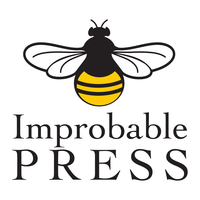You’ve written tens of thousands of words of short stories, fanfiction, character development, and you want to sell something damn it. Obviously you’re already a writer — you write, so that makes you a writer, that's the rules — but now you want to be a professional. A professional is paid to write. Even if she makes £1 she’s a pro. She was paid.
So, how do you do it, how do you make that first sale? I know it seems hard (it did to me), because you get a lot of rejections or just silence (which is worse? Is it worse? I think so. I think. Maybe?).
Well, below are two teeny tiny suggestions that worked to help me make my first sales and start writing for a living.
How to Sell Your First Story: Write for an Anthology
It doesn’t matter what you write: vampire or supernatural stuff, hockey stories, Sherlock Holmes mysteries, erotica, fantasy—there are small presses putting together an anthology that needs your work.
For example, if you write erotic fic, there’s Improbable Press, Clan Destine, Manifold Press, Carnation Books, Lethe Press, Riptide Publishing.
Keep your eye on these and the websites of your favorite publishers then, when they post a ‘call for submissions,’ jump on it (for example, Riptide Publishing wants some stories right now; so does Improbable Press). Read the submission guidelines for every single call closely, obey the deadline, send them your best work.
Let me repeat something, and it’s important:
Read submission guidelines closely.
Send a publish what they are asking for.
Please do not do not do not send them the story that’s been tucked in a chilly corner of your hard drive for a year, a story that kind of fits. They'll know you didn’t write it for their anthology (or their sort of press). Believe me they will know.
Even more importantly: Other writers will have read the guidelines closely, they'll have sent the publisher what they asked for. Their story will be picked over yours. You’ll feel not so great.
Don’t do that to yourself. Give the publisher what they asked for, and send it in by the deadline. Not the day after.
Then do that again.
And again.
With as many anthologies as sound exciting to you, keep writing, keep submitting. The more stories you have out there, the less important just one feels and if you get a rejection from one place, you have every chance of an acceptance from another. So keep writing and submitting.
Then there’s the other way to make your first writing sale.
Get a Job Writing for a Living (You Can)
I write fiction. I love writing fiction. In a perfect world that would be the source of all my income.
It's not.
However, when I was nearing thirty I decided I wanted to be a writer for a living and so I decided any sort of writing would do.
So I sat down one week and wrote a technical manual for some software I loved. I wrote one sturdy chapter, formatted it as if it came from a larger manual. Then I applied for technical writing jobs with an employment agency and used the manual I made up as my writing sample.
I got the first technical writing job I interviewed for and for the next ten years I was a technical writer.
Writing.
For.
A.
Living.
Was I being paid to write novels? No. Short story collections, scripts, plays? No, no, and no.
But I was being paid for my words and I’ll tell you that that does wonders for your ego. It makes you believe in yourself. It fills your pockets. With all that going for it, you’ll find yourself believing you can do more. You’ll find yourself with enough energy to write stories at night. You will.
Then you’ll submit them to anthologies, yeah? Or pitch publishers—like Improbable Press—your book ideas.
Before you do that read. their. guidelines. Read them close. Believe what you read. They know what they want so believe them. Then pitch them a book. If they say no, think up another book. And another. You want to write? Write. Coming up with ideas and then crafting pitches is writing.
So write.
And send.
And send.
The first sale, it happens. It does. But very rarely that first time. So keep going. And going. People want to read stories, you want to write stories. Your market is out there.
You are a writer.
Write.
